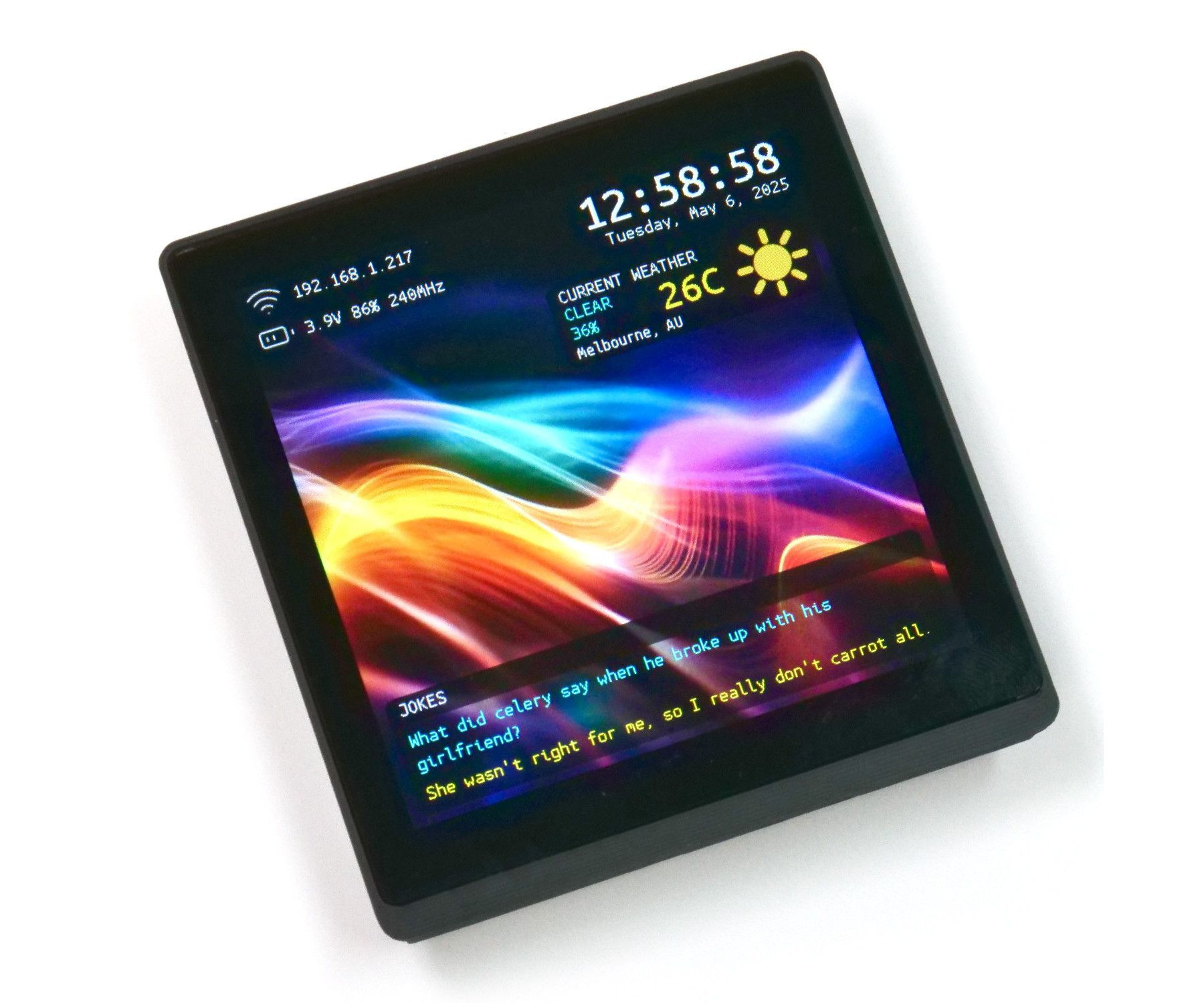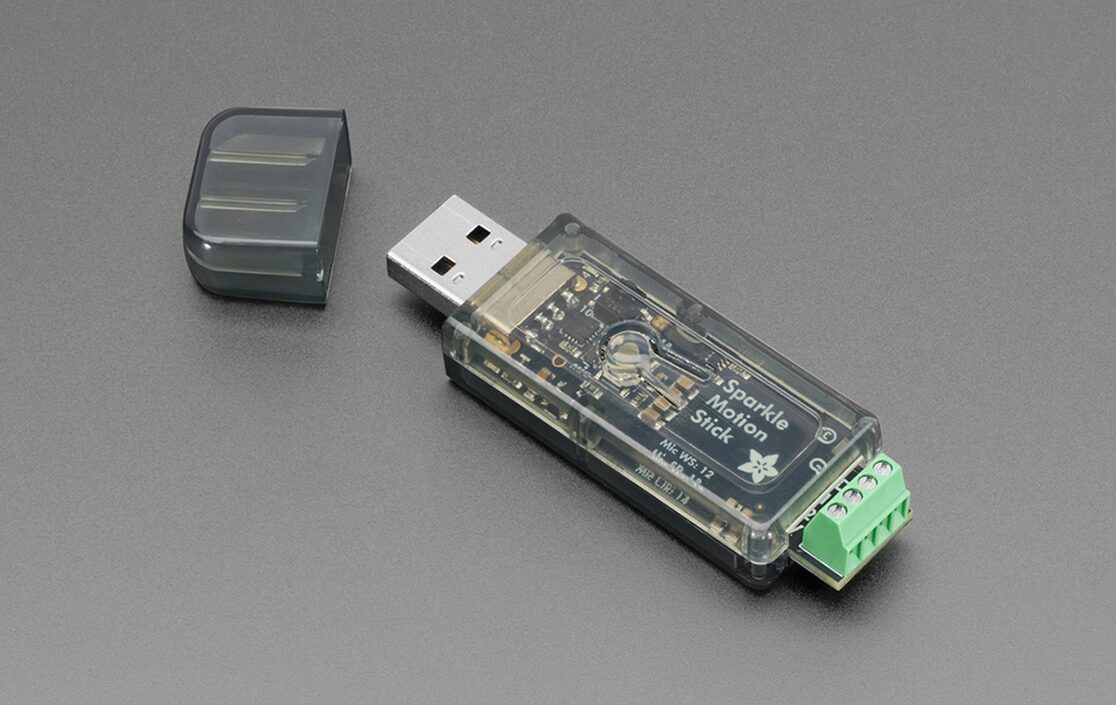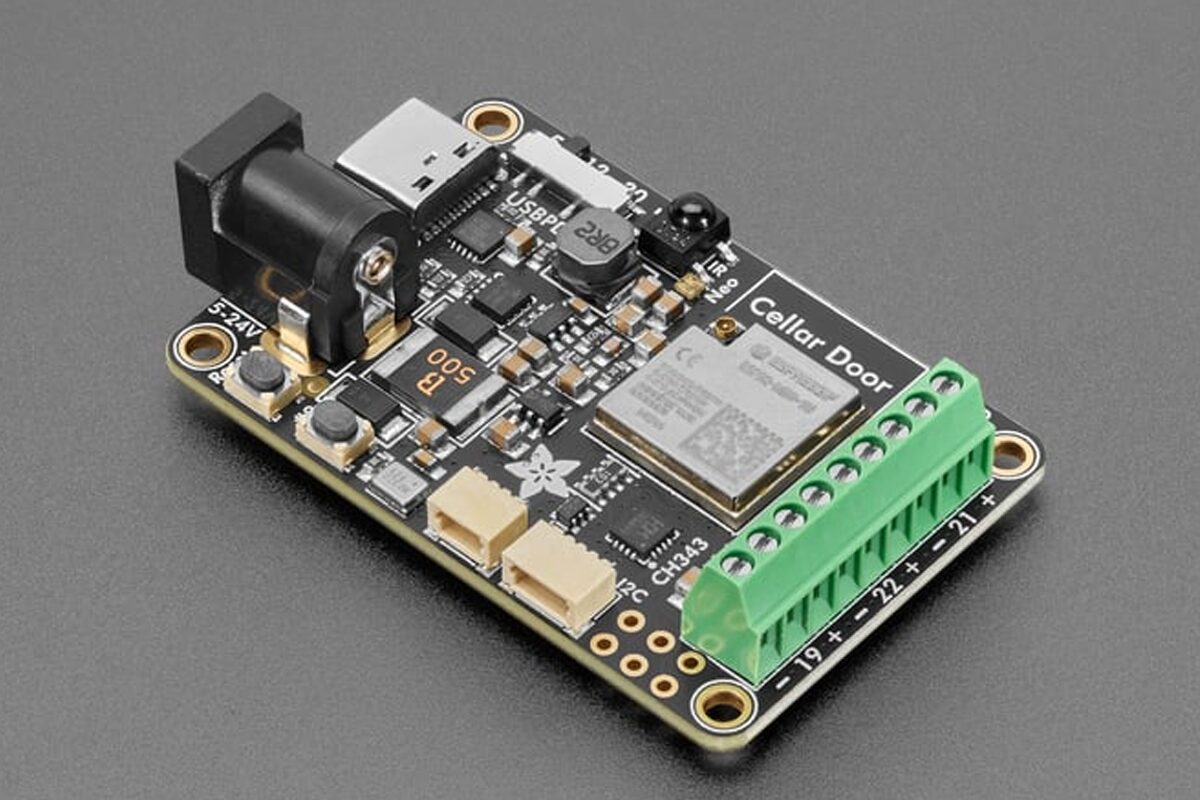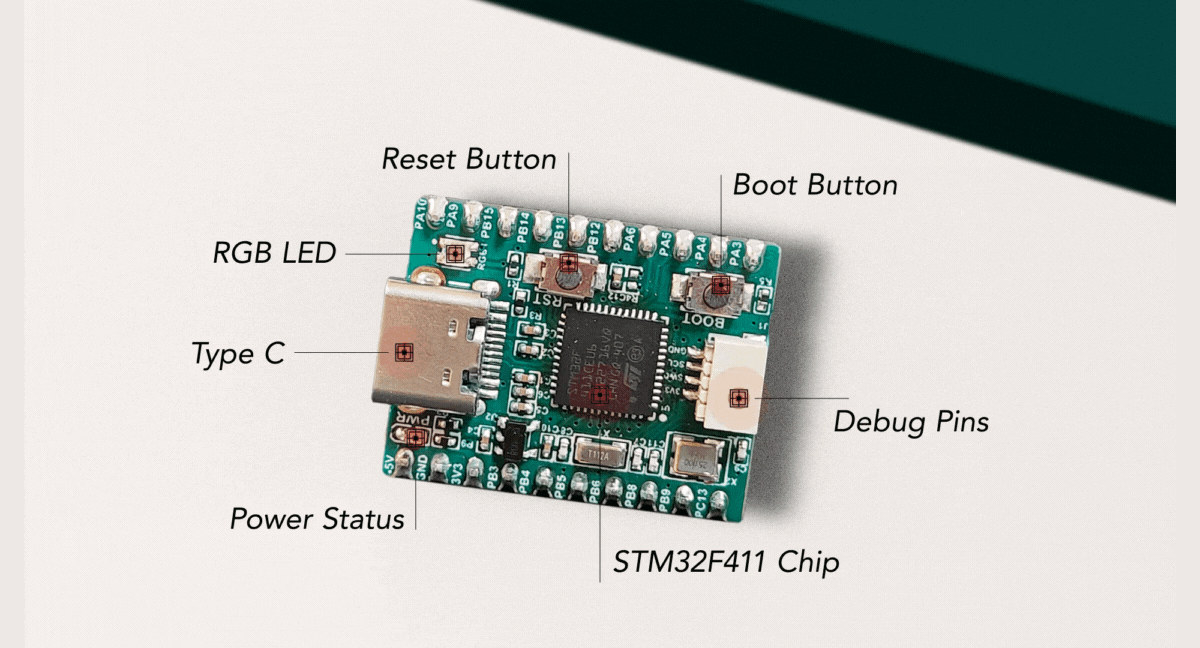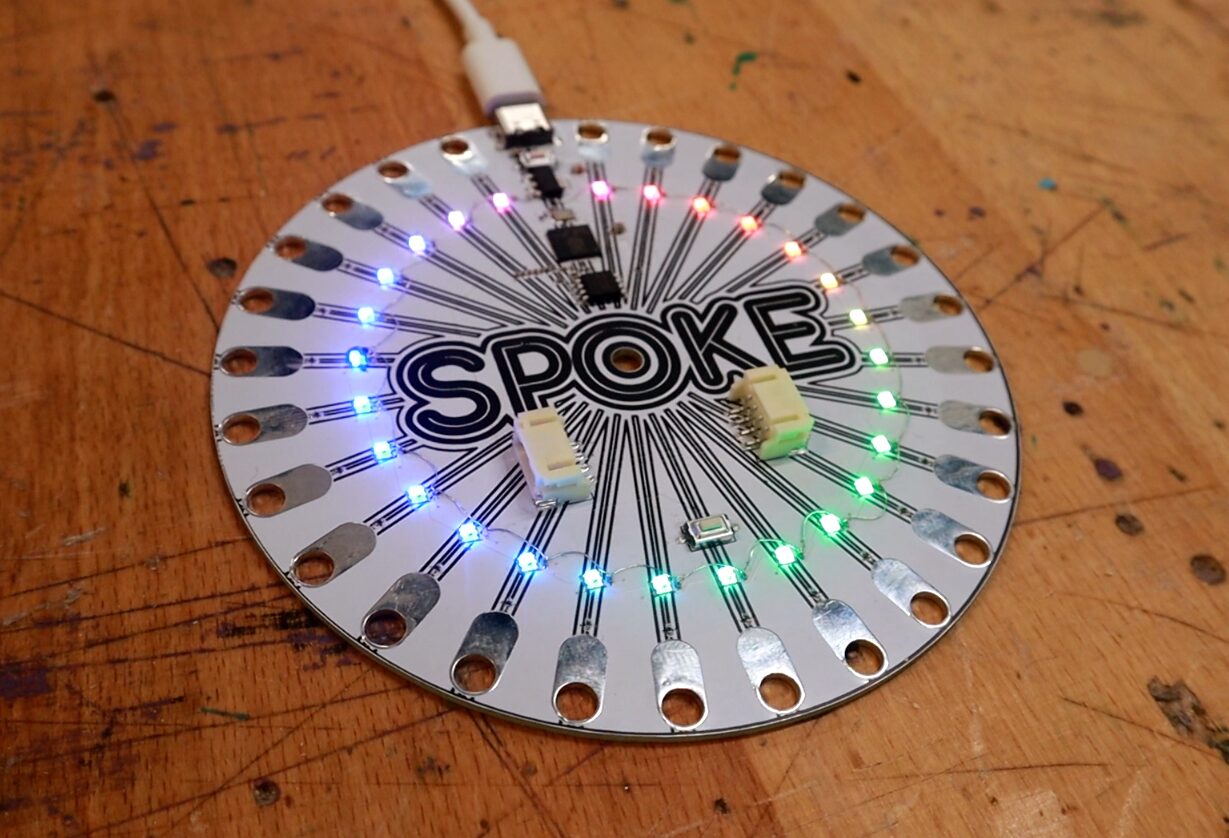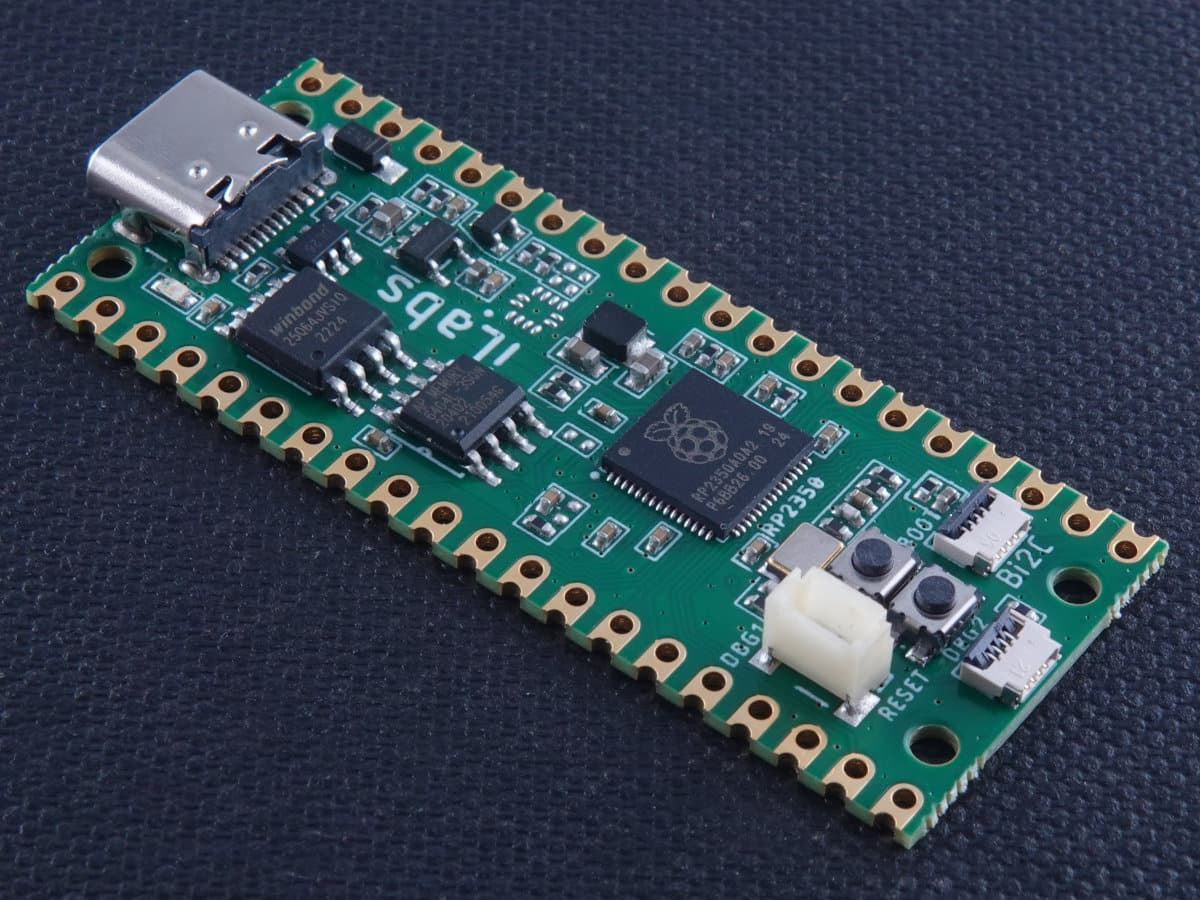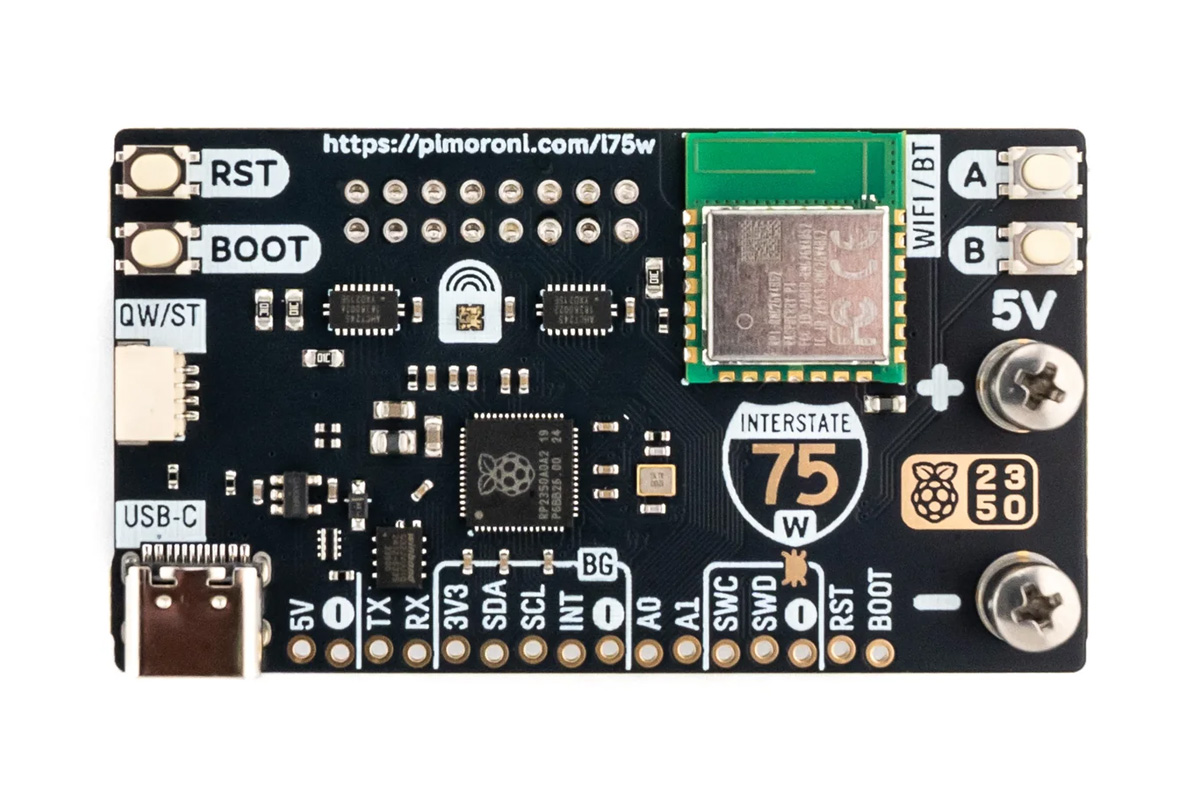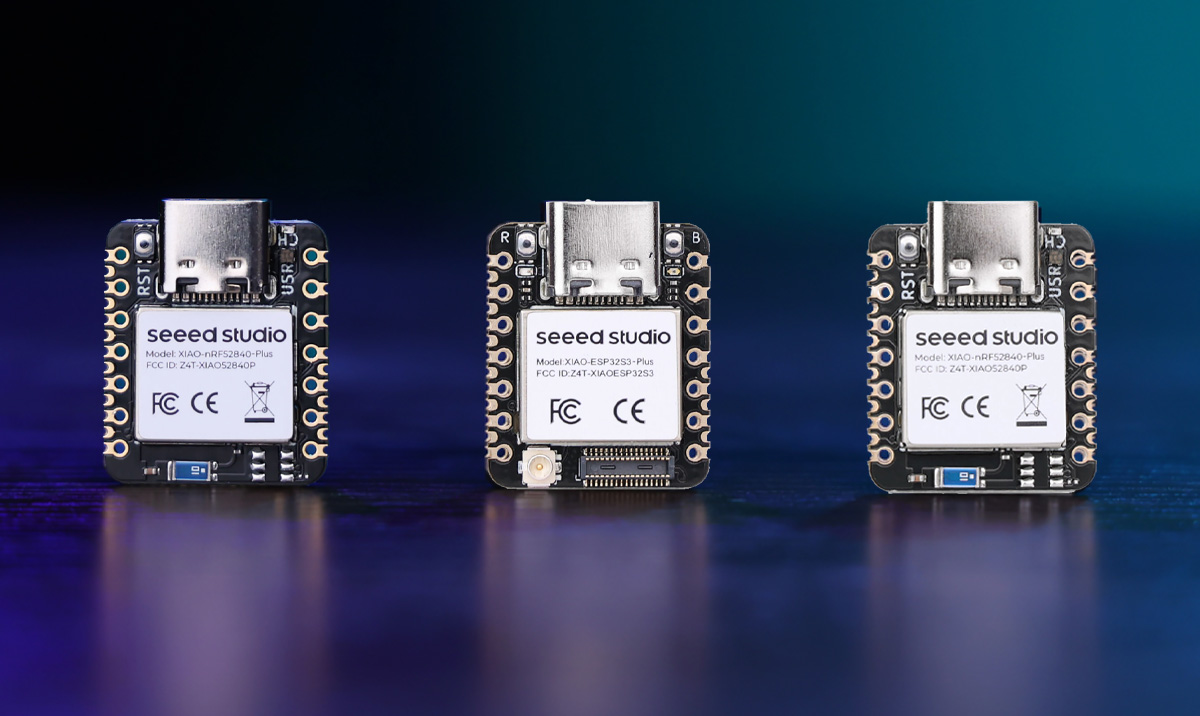Unexpected Maker’s SQUiXL is a battery-powered ESP32-S3 WiFi and Bluetooth IoT controller and development platform with a 4-inch touchscreen display with 480×480 resolution. Designed for makers, hardware engineers, embedded developers, and home automation enthusiasts, the SQUiXL integrates with 8MB PSRAM and a 16MB SPI flash for plenty of resources for the firmware. Other features include a microSD card, an amplifier with speaker connector, a haptic driver and motor, an RTC, and a STEMMA/Qt connector for expansion. SQUiXL specifications: WiSoC – Espressif Systems ESP32-S3 CPU – Dual-core Tensilica LX7 @ up to 240 MHz with vector instructions for AI acceleration Memory – 512KB RAM Wireless – 2.4 GHz WiFi 4 and Bluetooth 5.0 LE + Mesh Memory – 8MB octal PSRAM Storage 16MB QSPI flash MicroSD card slot (multiplexed with audio amplified) Display – 4-inch 480×480 RGB display with capacitive touch (GT911) Audio MAX98357A I2S Audio Amplifier (multiplexed with microSD card […]
Adafruit Sparkle Motion Stick – A compact ESP32-S3 USB WLED controller board with dual 5V LED outputs, an I2S Mic, and a snap-fit enclosure
Adafruit has recently released the Adafruit Sparkle Motion Stick, a compact, WLED-friendly Neopixel USB controller board built around an ESP32-S3 Module designed for audio-reactive LED projects, cosplay props, holiday lighting, and more. The module comes with a USB Type-A port for programming and power input (5V, 2A max), and a simple enclosure for protection (not weatherproof). It includes a built-in I2S microphone for audio-reactive effects, an IR receiver for remote control. Other than that it has a user-programmable button, an onboard NeoPixel LED, and a red status LED with two 5V-level shifted signal outputs with power and to connect the LEDs a screw terminal blocks. Adafruit Sparkle Motion Stick specifications SoC – ESP32-S3 dual-core Xtensa LX7 MCU @ 240MHz with 2.4GHz Wi-Fi and BLE 5 LED Control – 2x level-shifted output channels (5V logic) with terminal blocks (26–20AWG support) Audio Input – Built-in I2S MEMS digital microphone for audio-reactive lighting Infrared […]
Adafruit Sparkle Motion – An ESP32-based addressable LED controller with four outputs, 100W USB-C power, and WLED/xLights support
The Adafruit Sparkle Motion is an ESP32-based LED controller board designed to drive addressable LEDs, including WS2812B, APA102, SK6812, LPD8806, UCS2904, and SM16704. It supports both WLED and xLights projects and features an onboard 100W USB-C PD port to drive even high-voltage LED setups. The board includes dual power input options (USB-C PD with 5/12/20V selection and 2.1mm DC jack), a 5A fuse, and level-shifted output terminals for controlling addressable LEDs. The board also features a built-in I2S digital microphone, IR receiver, Stemma QT I2C port, USB-serial with auto-reset, GPIO breakout pads, onboard NeoPixel and status LED, and multiple JST and terminal connectors for sensor and control integration. It comes pre-assembled with terminal blocks for easy wiring, making it suitable for applications such as wearable electronics, home decor lighting, audio-reactive displays, and remote-controlled installations. Adafruit Sparkle Motion Specifications: SoC – ESP32-S3 dual-core Xtensa LX7 MCU @ 240MHz with 2.4GHz Wi-Fi and […]
Xero MCU is a compact USB-C board based on STM32F411 microcontroller (Crowdfunding)
Xero MCU is a small STMicro STM32F411 Arm Cortex-M4F microcontroller board with a USB-C port, twenty through and castellated holes for GPIOs, a Debug connector, Reset and Boot buttons, and a few LEDs. The 100 MHz MCU embeds 512KB flash and 128KB SRAM, and the board is said to be designed for hobbyists, students, and professionals. For reference, the Xero MCU board features the same STM32F411CEU6 microcontroller found in the Black Bill board. However, it’s quite shorter at about half the size, and features castellated edges, making it suitable for soldering on a baseboard. Xero MCU specifications: Microcontroller – STMicro STM32F411CEU6 Arm Cortex-M4F MCU @ 100MHz with 512KB Flash, 128KB SRAM USB – 1x USB Type-C port for power and programming Expansion – 2x 20-pin through and castelled holes with up to 17x GPIO, I2C, 2x SPI, 2x UART, 4x ADC, 5V, 3.3V, and GND Debugging – 4-pin debug connector […]
SPOKE capacitive touch sensor board targets interactive computer interfaces (Crowdfunding)
SPOKE is a Raspberry Pi RP2040-based capacitive touch sensor board for interactive computer interfaces. It is designed to simplify the integration of touch-based control into various projects. SPOKE features up to 27 sensor inputs and can “turn almost any conductive material into a sensor” to control almost any computer input. Potential applications include music making, video game controlling, typing, and general software controlling. The board was designed by Tom Fox, an educator, maker, and musician in the UK. According to him, the board is accessible to beginners getting started with touch sensing while retaining enough power and customizability for professional use. It works with several conductive materials, including copper pipes, conductive paint, aluminum foil, pencils, conductive filaments, fruits, fabrics with conductive threads, and metallic surfaces. It can also be used with a non-conductive material (such as plywood) if a conductive material (e.g. tinfoil) is behind it. The fully-featured SPOKE capacitive […]
CPico RP2350 is another Raspberry Pi Pico 2 alternative with USB-C, 8MB flash, 2MB PSRAM, BConnect I2C & debug ports
iLabs CPico RP2350 is a Raspberry Pi Pico 2 alternative with the same form factor, still based on the Raspberry Pi RP2350 microcontroller but equipped with a USB-C port, 8MB flash, 2MB PSRAM, a Reset button, and Bconnect I2C and debug ports. Apart from that, the CPico RP2350 retains the other features of the Raspberry Pi Pico 2 including the two 20-pin PGIO headers, and BOOT button. It joins other Raspberry Pi Pico 2 alternatives like the Waveshare RP2350-Plus adding battery support. CPico RP2350 specifications: SoC – Raspberry Pi RP2350 CPU Dual-core Arm Cortex-M33 @ 150 MHz with Arm Trustzone, Secure boot Dual-core RISC-V Hazard3 @ 150 MHz Up two cores can be used at any given time Memory – 520 KB on-chip SRAM Security 8KB of anti-fuse OTP for key storage Secure boot (Arm only) SHA-256 acceleration Hardware TRNG Fast glitch detectors Package – QFN-60 Memory – 2 MP […]
Pimoroni Interstate 75 W (RP2350) board is designed for HUB75 LED matrix panels
Pimoroni Interstate 75 W (RP2350) is an all-in-one RGB LED matrix driver board designed for HUB75 LED matrix panels commonly used in video walls, advertising displays, and creative signage. Built around a Raspberry Pi RP2350 chip this board also uses the Raspberry Pi’s CYW43439 module for Wi-Fi and Bluetooth and features user buttons, an RGB LED, and a Qw/ST connector for integration with Qwiic/STEMMA QT breakouts. The kit is compatible with various LED matrix sizes (32×32, 64×64, etc.) and comes in a starter kit with panels, cables, and magnetic feet for quick setup. All these features make this kit useful for applications including real-time data like bus times, air quality, or sensor outputs, dynamic signage, scrolling text, and more. Pimoroni Interstate 75 W (RP2350) specifications: SoC – Raspberry Pi RP2350A CPU Dual-core Arm Cortex-M33 @ 150 MHz with Arm Trust zone, Secure boot OR Dual-core RISC-V Hazard3 @ 150 MHz Up […]
Seeed Studio XIAO Plus series adds more GPIOs through castellated holes
In response to community feedback for more I/O options, Seeed Studio has recently launched the Seeed Studio XIAO Plus series with 23 castellated mounting pins (20 GPIOs, 3 power pins) and improved back solder points, improving compatibility with carrier boards for complex projects. The new series includes the XIAO ESP32S3 Plus, XIAO nRF52840 Plus, and XIAO nRF52840 Sense Plus which are direct upgrades of the XIAO ESP32S3, XIAO nRF52840 BLE, and XIAO nRF52840 Sense boards. The new design allows for easier assembly and scalable production, with double the I/O options. XIAO ESP32S3 Plus The Seeed Studio XIAO ESP32S3 Plus is a compact development board with a total of 23 pins on the board out of which 11 are through-hole GPIO pins 9 additional SMD castellations GPIO pins and 3 through-hole are power pins. The board is built around an ESP32-S3 MCU so it has 2.4GHz WiFi and BLE 5.0 connectivity. Other […]


